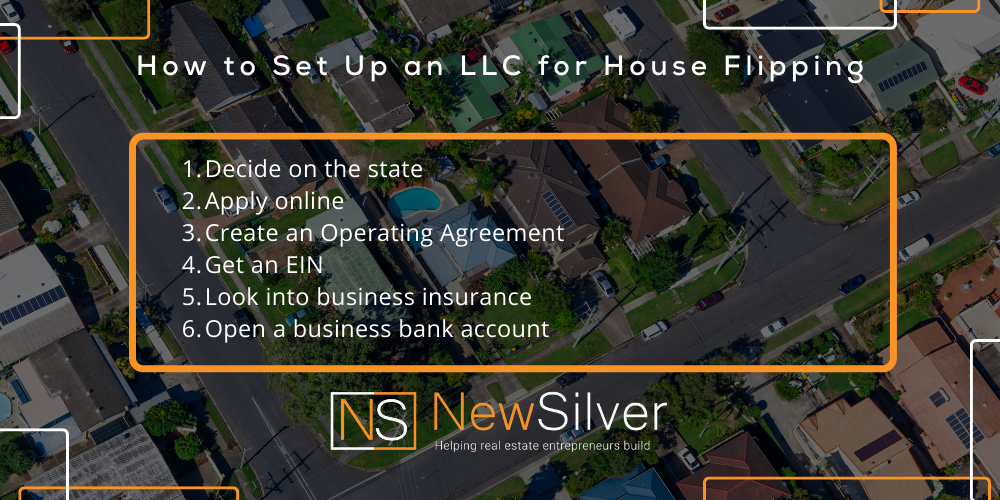A short overview
New to the house flipping game? One of the first things you’ll need to do when setting up your house flipping business is check out the structures available. An LLC is one of the most well-known business entities for house flipping and can be a great option. If you’d like to know more, we’ll take a closer look at how to set up an LLC for house flipping.
Key Topics
If you’re getting into the house flipping business, you’ll be looking into the most effective way to do this. Which means that you need to consider each part of the process and decide on a strategy that works best for you. One of the first steps is to figure out a real estate business entity to use, and the most widely used option is to set up an LLC. If you’re wondering how to do this, we’ve got you covered. Read on to find out how to set up an LLC for house flipping, so that you can be prepared.
Do you need an LLC for house flipping?

When you’re choosing a business entity for your house flipping business, it’s important to consider 3 key factors:
- Liability: Keeping your personal assets safe and separate from your house flipping business is an important consideration. Should you ever get sued in a business capacity, you’ll want to make sure that your personal assets cannot be touched.
- Taxes: Using the structure that requires the lowest taxation makes the most sense for a house flipping business and is something you should consider at the outset.
- Active investing: House flipping is typically an active way of investing, which means that your business will be active, so you should think about how many houses you’ll be flipping before you choose a structure.
- Setting up: If you’re looking for a business setup that is easier, factor this into your choice from the start. Some people want a quick setup where you aren’t required to have an attorney present. Others are happy to do a longer process with their attorney.
While an LLC isn’t required to fulfil all these considerations, it’s a popular choice for investors who wish to protect their personal assets, save on tax by deducting some of their expenses, and use a structure that promotes active investing via a quick setup without the need for an attorney.
Can you flip houses without using an LLC?
While an LLC is the most common entity to use, you can still flip houses without using an LLC if it’s not your preferred option. S corporations, C corporations, Sole Proprietorship and Limited Liability Partnerships are other options to consider when starting a business for flipping houses. These can fit some of your needs, however, make sure to look at each in relation to whether they fully fulfil your business requirements.
How to set up an LLC for flipping houses
To operate a house flipping business legally, you’ll need a business entity. If you decide to go ahead with an LLC, here’s a step-by-step look at the process of getting set up.

Step 1: Decide on the state
The first step to forming an LLC is deciding which state you’ll be operating in and forming your LLC in that state. Most people pick the state where they live to conduct their business and therefore set up their LLC, but you may choose to do business in any state. Research the real estate market in each state and pick the one that best suits your and your strategy, and then open your LLC after that.
Step 2: Apply online
Once you’ve decided on your state, you’ll need to file certain organizational documents with your State Secretary. These documents can vary from state to state, so check with your State Secretary beforehand. There is also an online application that you’ll need to do on the Secretary of State website, and a small fee is usually charged for applications.
Step 3: Create an Operating Agreement
Some states require an Operating Agreement or Articles of Organization to be submitted, and even if it’s not a requirement, it’s generally good practice to do this anyway. The Operating Agreement should contain detailed information on how your business will be run, and the profit distribution that will occur. This document is useful in the event of a conflict, so it’s important to do this at the start.
Step 4: Get an Employer Identification Number (EIN)
This is only applicable for those who plan on hiring employees for their business. An EIN is not required for LLC’s who have no employees. You can apply for this online with the IRS, they will then use this for tax purposes to work out what your business is responsible for when it comes to taxes.
Step 5: Look into business insurance
If you’re going to be hiring employees, this step is critical because you’ll need worker’s compensation, disability insurance and more. However, even if you aren’t hiring employees, it’s important to look at the other insurance options your business may need. Such as commercial property insurance and general liability insurance, which are good to have as protection for both you and your business.
Step 6: Open a business bank account
The next step you’ll need to take on your journey to setting up an LLC for your house flipping business is to open a business bank account in the name of your business. This is necessary to fund your business and along with it, you should also open a business credit card in the name of your business. This will help you keep your business finances separate from your personal ones.
How do I start flipping houses with an LLC?
Once you’ve set up your LLC for a house flipping business, its time to look at buying your first house to flip. Here’s a quick guide on how to start flipping houses:

1. Research the market
The first step to flipping houses with an LLC is to research the local real estate market. This is a vital component of choosing the right investment property because each area has different market trends and therefore some may provide better investing opportunities.
2. Set a budget
Once you’ve researched the area, you can begin gauging a general price range of the type of property that you’re looking to purchase. Remember to factor the repairs and renovations into this, along with the purchase price, when you’re working out your budget. Set a budget that is realistic for your business, and not too much of a stretch. You wouldn’t want to land in hot water with the first house purchase.
3. Use the 70% rule
When it comes to house flipping, the 70% rule is one of the most useful tools for real estate investors to use to determine whether an investment property is a good deal. Also known as ‘the house flipping formula‘ the rule is that an investor shouldn’t pay more than 70% of the After-Repair Value (ARV) of the property once the cost of the repairs has been deducted. This formula will give real estate investors a good indication of whether an investment property is worth purchasing or not.
4. Get financing
Once you’ve decided to go ahead with the property purchase, you’ll need financing. An LLC can get financing through various channels. Hard money loans, bank loans and private money lenders are a few of the ways you an get funding for the purchase of the house. It’s a good idea to get pre-approval for the loan and use this to secure your offer on the house.
5. Find a house
Using a real estate or online platform like FlipScout, you can find an investment property. Once you’ve landed on one that is well suited to you, it’s a good idea to hire a contractor to do an inspection and give you advice on how much the renovations would cost. This will help you decide if the home will fit into your budget or not. Houses in foreclosure or distressed homes are typically good properties to use for fix and flip projects.
6. Fix it up
This is when the fun begins, and you can upgrade the house. You’ll need a reliable team to help you with this and they should also be focused on sticking to your budget and the project timeframes.
7. Sell the house
Once the renovations are complete, it’s time to get the house back on the market, at the new price, which should allow you to make a good profit and pay back the loan you took.
Benefits of using an LLC for flipping houses

- Personal asset protection: Your personal assets cannot be touched, in the event of a legal issue, thanks to the personal liability protection offered by LLC’s. This means that you’ll have a limited liability company.
- Tax benefits: The tax benefits offered by an LLC are centered around pass-through taxation. This means that the profits that occur will pass through to each individual owner where they will be taxed. Profits are therefore only taxed once instead of twice.
- Easy to set up: LLC’s are easy to set up and maintain, because the process is all online and requires less paperwork than other business entities such as corporations. An LLC simply has a less complicated structure.
- Flexible management: An LLC offers very few restrictions around the number of owners, and the management of the LLC is also flexible.
Drawbacks of using an LLC for flipping houses
- Tax on earnings: All investors within the LLC will be taxed on their earnings, regardless of whether they actually received their share of the distribution or not.
- Tax delays: When filing personal tax returns, those who are part of an LLC will need to hold off and acquire a K-1 form before they can file. This can be a deterrent for some people.
- Extra fees: Some states, such as California, charge members extra fees just for operating an LLC.
Other business entities to consider

S Corporations
These are also known as an S subchapter for taxation purposes. This type of corporation is formed to meet particular IRS requirements and offers tax benefits to those who form this type of legal structure. One of these benefits is that an S Corporation can pass income directly to shareholders, without paying federal corporate tax on this income first. Essentially, this structure allows members to enjoy the tax benefits of a partnership, while still being in a corporation.
C Corporations
In this corporation, the owners are taxed independently of the business. The corporation itself, however, is still subject to corporation owners’ taxation. So, there is double taxation on any profits earned by the business. While this may not be desirable for many, this business structure also separates liability from personal assets and the business itself. C corporations need to have a board of directors which are voted in by the shareholders.
Sole Proprietorships
A sole proprietorship is the business entity for a single person owning the business by themselves. There is no legal distinction between the business owner and the business itself. This isn’t to say that the sole proprietor does all the work themselves, however the business structure recognizes them as the sole owner.
Final thoughts
Forming an LLC for house flipping is a common strategy to capitalize on the tax benefits offered by this business structure, as well the flexible nature of managing it, and the ease of set-up. While it may not be the right structure for everyone, it’s worth considering as an alternative on your search for the right legal structure for your house flipping business.



